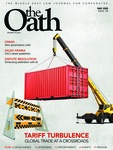News from the Courts
· The DIFC Wills and Probate Registry (the Registry) has registered a total of 650 wills this past year, showing the positive response the initiative has received in Dubai. Launched in May 2015, the Registry provides non-Muslim expatriates with legal certainty and the ability to register English language wills covering Dubai estates that allow their assets to be transferred upon death according to their wishes.
The uptake shown since the inception of the Registry reinforces its status as a much needed and unique solution for non-Muslims with assets in Dubai. The registrants represent a wide section of Dubai’s expat community – of the 650 registered wills, the majority of registrants are from Europe making up 55 per cent of the registrants, 27 per cent are from India and the rest of the registrants are expats from across the world including Asia, Africa and the Americas.70 per cent of the wills registered were executed by both husbands and wives. This number has significantly increased over the past few months, reflecting families’ increased awareness of how important it is to protect their wealth and their family and children. The Registry makes an important contribution to Dubai’s larger value offering as a destination for investment and a secure environment. The Registry also launched a new state of the art mobile application called ‘DIFC Wills’ which allows a swift and simple appointment booking system through the mobile phone, for a seamless booking experience. Another benefit of the app is to also allow lawyers to access the appointment calendar for their clients, as well as to consult the Registry Rules in a few clicks, directly from their mobile phones.

· Abu Dhabi Global Market (“ADGM”), the international financial centre in Abu Dhabi, announced that the Board of Directors of ADGM has enacted the ADGM Courts Civil Evidence, Judgments, Enforcement and Judicial Appointments Regulations, supporting Rules and ADGM’s Arbitration Regulations. The chief justice, Lord David Hope of Craighead, has also enacted Rules covering judicial conduct and complaints made against judicial officers.
These significant developments for the ADGM Courts added another important milestone for ADGM, namely, the establishment of a judiciary and system of law that is founded upon long standing, recognised and accepted principles of law at the heart of which is the impartiality, independence and integrity of the Judges of the ADGM Courts. With the establishment of this system of law and the appointment of the Judges, the global business community can be assured that ADGM is committed to providing clear, transparent and robust regulations and rules of the standard of an international financial centre.
In early 2016, the ADGM Courts will be issuing court procedure rules and practice directions. These will detail the Courts’ practices and procedures, including streamlined and simplified procedures, particularly for parties involved in claims before the Small Claims Division and the Employment Division.
· The Dubai Courts has launched a new service called ‘Qarib’ or ‘Near’ which provides services of personal status testimonies and notary authentications via the video system.
Dubai Courts provides Qarib service for testimonies in the branches of Al Barsha Mall and Hatta, while the service of notary authentications is provided in Hatta branch only during the official daily work hours. Through this service, the testimony of witness in the personal status transactions will be documented via the video system after verification of his/her identity. The witnesses won’t be required to attend the court headquarters or its branches.
“Qarib” also enables the notary in the headquarters to communicate with the client in Hatta branch and verify the legality of the transaction and identity of the applicant, and then completes procedures of authentication instantly. HE Tarish Eid Al Mansouri, director general of Dubai Courts stressed keenness of Dubai Courts to adopt innovation as an approach and a well-established culture and a daily practice to provide services meeting the highest standards.“We seek to put the UAE among the most innovative countries in the world, and achieve higher rates in the global competitiveness standards” Tarish said.
The service of personal status includes declaration of conversion to Islam, proof of matrimony, proof of the re-marriage, proof of marriage continuation, and other testimonies relating to cases of marriage and divorce. It also includes the will, endowment and grant, as well as parentage, custody, ratifications, permissions, requests for names, and testimonies of non-Muslims, proxies, determination of heirs, and certifications of national service.
Meanwhile, the service of notary authentications includes: authentication of the contracts, concluding or terminating contract, assigning local service agent, contract of sale of a shop, ratification of declarations which includes undertaking for not working, a pledge and undertaking for the Ministry of Labour, undertaking of selling a marine means, and undertaking of waiving a lawsuit or a complaint. It also includes ratification of the proxies like general proxy, a proxy for lawsuits, a general power of attorney, a proxy for the Ministry of Labour, and the proxy for a land or grant. Furthermore, the Dubai Courts has recently launched the hall of smart personal status services in the personal status department at its headquarters. It also launched the service of “Intiqal” or "transition," which has been created to allow the clients to accomplish the notary transactions from any place. It is worth mentioning that the Dubai Courts transferred 217 of its services to smart services on the first of its kind smart application in government and judicial sectors at the world level. It is a supportive step towards making Dubai to be the world’ smartest city.

























































































































